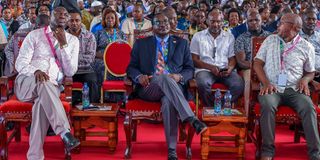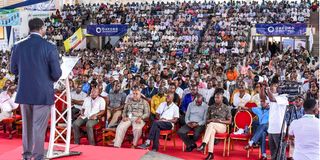Principals list demands to keep public schools running

Education Cabinet Secretary Julius Ogamba (center) with his Principal Secretary Prof Julius Bitok (left) and the national chairman of Kenya Secondary Schools Heads Association Willie Kuria during the 48th Annual National Conference for Kenya Secondary Schools Heads Association in Mombasa on June 25, 2025.
What you need to know:
- The association wants schools to be guided on how to source funds to make up for the shortfall.
- The principals also want the State to review boarding and lunch fees in public secondary schools.
Principals manning more than 7,000 public secondary schools across the country want the government to allocate minimum operational funds for low-enrolment schools and suspend infrastructure fund transfers to address outstanding debts.
The principals, through their Kenya Secondary Schools Heads Association (Kessha), also want capitation and school fees to be reviewed every three years to reflect inflation, with timely disbursement emphasized.
The principals urged the government to address funding and capitation challenges in their learning institutions, adding that some students learning in public secondary schools are not funded because they are not captured in the National Education Management Information System (Nemis) due to birth certificate challenges.
The government has been using Nemis to disburse capitation to schools.
“Activity funds at all levels should be transparently disclosed to help schools bridge financial gaps,” said Mr Abdi Noor, National Secretary of the Kenya Secondary Schools Heads Association.
The association said the current capitation of Sh22, 244 per learner was last reviewed seven years ago, adding that it is incongruent with prevailing economic realities.

Education Cabinet Secretary Julius Ogamba delivers his speech during the 48th Annual National Conference for Kenya Secondary Schools Heads Association in Mombasa on June 25, 2025.
“The working population for 2025 capitation disbursement is 3.2 million learners. For Term 1, the expected amount was Sh11, 122, however, we got Sh8, 818, with a balance of Sh2, 304,” said Mr Willie Mwangi, the association’s chairman.
In the second term, schools are supposed to get 30 per cent, which is Sh6, 673. However, they were wired Sh3, 471, with a balance of Sh3, 202.
“We have a total amount of undisbursed funds for Term 1 and Term 2 standing at Sh18 billion. The total amount of undisbursed funds for Term 1 is Sh7.5 billion, while undisbursed funds for Term 2 stand at Sh10.5 billion,” said Mr Mwangi.
The association wants schools to be guided on how to source funds to make up for the shortfall.
The principals further want the Ministry to advise schools on measures to take where Form 4 students exit with fees arrears. This is after the MoE directed principals to release certificates to all Form 4 leavers regardless of fee arrears.
The principals also want the State to review boarding and lunch fees in public secondary schools to factor in inflation.
Mr Noor further urged the Teachers Service Commission to expand job groups from D5 to D7 and expedite promotions for acting principals serving over six months, especially in Arid and Semi-Arid Land counties.
The principals want TSC and unions to develop a new Collective Bargaining Agreement addressing teacher emolument issues.
“Reassessment of gratuity for support staff, given existing NSSF contributions,” he added.
The secondary school administrators further pledged to embrace flexibility, creativity, and innovation while implementing senior school pathways.
However, they urged the government to enhance the Kenya Institute of Curriculum Development's capacity to develop and evaluate learning materials in a timely manner.
“Only the highest-quality textbooks should be approved for schools,” said Mr Noor.
To develop and enhance talent, the stakeholders urged the state to enhance teacher retooling.
The principals said they would collaborate with financial stakeholders including the Institute of Certified Public Accountants of Kenya (ICPAK) for bursar training and sound financial management.
“We will promote clean energy adoption. Increased use of digital tools in teaching, learning, and assessment is encouraged, and we will support National Identification Card registration for learners aged 18 and above,” he said.
The principals said they will adhere strictly to Ministry of Education policies and procurement laws.
Some of the policies include full implementation of electronic Government Procurement (eGP) to improve transparency.
Mr Kuria said the new CBA should uplift the salary scales of teachers for school heads to work with a motivated team.
“Teachers with low pay will always try other means to eke out a living, which makes them difficult to control,” he said.


